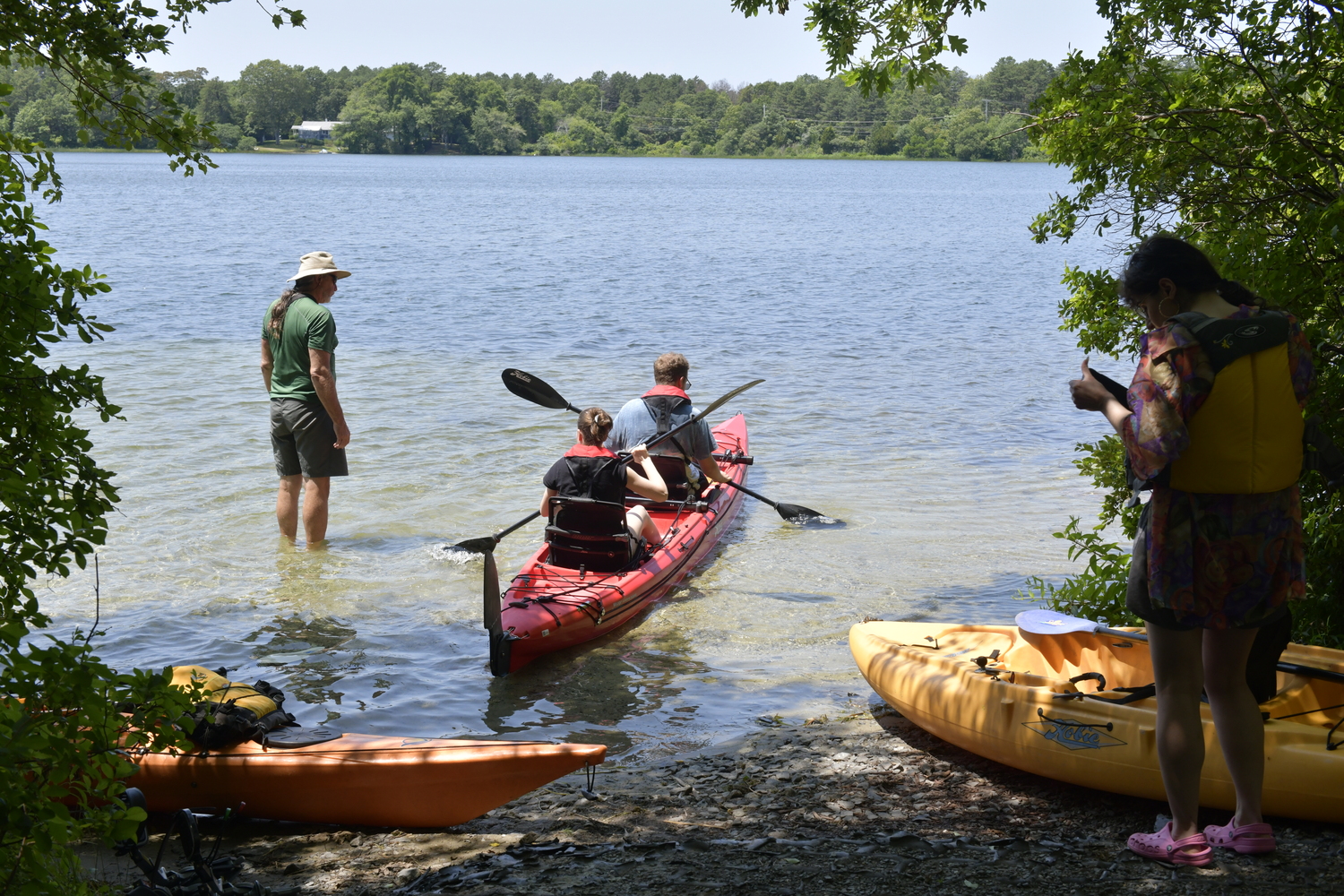
Retired science teacher and geologist Robert Mozer has been sampling water at ponds on the western edge of Southampton Town since 2019.
Through the Adopt-a-Pond program, the Remsenburg resident collects samples from freshwater bodies and, in collaboration with Dr. Chris Gobler’s lab at the School of Marine Sciences at Stony Brook Southampton, has them analyzed for harmful algal blooms, or HABs.
HABs have been a scourge in some eastern Southampton ponds and lakes; Lake Agawam festers with blue-green algae regularly, and has for years.
When he began his volunteer effort, Mozer’s goal was to characterize study areas of West Pond, East Pond and Mill Pond in Speonk, Beaverdam Pond in Westhampton, Old Ice Pond in Quogue and Wildwood Lake in Northampton.
Recently, he’s added new tech to his effort through a collaboration with the Farmingdale State College Geographic Information Science program — drones. Last week, assistant professors John Gross and Doug Gallaway, along with students from the college, flew a drone over Lake Agawam, as volunteers paddled out in kayaks taking samples. The previous week, they conducted the same test over Wildwood Lake.
The plan is to compare the two to see if there’s a correlation between specific pigments tied to blue-green algae captured in spectral images to sample results. If there is, researchers would be able to detect blooms immediately. They’d also be able to find them in areas of lakes and ponds not typically used for water sampling.
“When I retired, I said there’s got to be something for me to do with what’s going on here,” Mozer explained. “I started on six ponds, five along Montauk Highway from Eastport to Quogue.”
Compared to water bodies like Lake Agawam in Southampton Village, ponds and lakes on the western side of Southampton Town receive little attention. Mozer noted the Suffolk County Department of Health Services monitors for the presence of fecal bacteria, but otherwise, he said, “There’s no government agency keeping an eye on these ponds.”
Throughout the years, as he’s collected samples of his ponds, Mozer always hoped to engage community members and local students in the study. He recently connected with Farmingdale College, and this season, students from the school’s Summer Undergraduate Research Institute are on board. “I have interns,” he enthused.
Mozer’s samples are tested for HABs, as well as nutrients in the water. He can turn the HAB samples over to Gobler’s lab for analysis, but to test for nutrients, he sends samples to a New York State certified lab and pays $65 for each test. “It starts to add up,” he admitted.
To help continue his quest to characterize the ponds, Mozer is founding the Citizen Science Learning Center, with the goal of qualifying for grants to continue the work.
From there, he’d love to see study expand throughout Southampton, and the East End. “The Town of Southampton has between 30 and 50 ponds alone,” he reckoned.
While one goal is to detect the algal blooms, the overall mission is to characterize the ponds, through environmental investigations that could include checking for invasive fish and plants, endangered species like the American eel, analyzing the pond water chemistry, and mapping the depth to the bottom of the ponds. During sampling at Mill Pond and Beaverdam Pond, evidence of the American eel was found in 2019 through Fish Tracker, a program through Cornell University that analyzes DNA in water samples to determine what animals could be there.
The drone imagery from Wildwood Lake and Lake Agawam is currently being processed and analyzed by faculty and students at Farmingdale College.
Lecturing at the Westhampton Free Library recently, Mozer explained the Citizen Science Learning Center Adopt-A-Pond program can provide student-based research projects for high school and college students. It can provide data necessary to characterize the health of local natural resources and inform residents whose properties abut ponds about potential exposure, plus help local town officials figure out how to safeguard the community from exposure to toxic blooms.
Mozer hopes to continue sampling for HABs twice a month and work to inform the community about any algal bloom events. He wants to craft methods of communication between property owners on the ponds and the community at large. Overall, what Mozer would like to do is engage the families in the community to become stewards of these natural resources as, like him, citizen scientists.
Concluding his presentation, Mozer spoke of the reasons for starting the Citizen Science Learning Center: “To support our specific mission to provide a resource for the environmental education of our children, to keep our residents informed of the health of our natural resources, and to notify them when a potential health risk occurs in near-real time.”